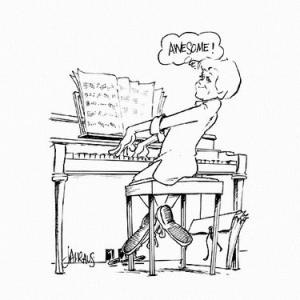
Learning any musical instrument is difficult. It takes a great deal of patience and practice to improve. The more effort your son/daughter puts in to their lessons and practice sessions at home, the quicker they will progress.
This introduction tells you what I expect from pupils whilst taking piano or keyboard lessons at school and hopefully it will help them become a good musician.
- LESSON TIMES
- It is important that you know your lesson time each week, check my website and ideally print off the relevant timetable to keep at home.
- Remember there is always an up to date copy on the Music Department notice board in school.
- It is polite to inform your subject teacher at the start of their lesson that you will need to leave part way through.
- Please allow at least five minutes to get from your lesson to practice room 1 where I teach so that you arrive on time.
- Remember - if you are late by five minutes to every lesson then you will have missed nearly three hours worth of teaching in a year!
If you can’t make a lesson because of a trip, exam, illness etc. please try and let me know as soon as possible, in person, by text or phone call. I will try and rearrange your lesson time but can only try and do this if I know early enough. If I don’t have prior warning that a lesson is to be missed or you forget to turn up, the lesson cannot be credited or ‘caught up’.
2. WHAT YOU WILL NEED
- A5 notebook, this will be provided and invoiced for at the start of each year.
- I also provide a plastic wallet for all new pupils.
- A CD player is useful as some of the books you will use have an accompanying CD of performances and backing tracks.
- A metronome is useful to help with keeping time and check the speed of pieces, as you become a more advanced player – either the clockwork or digital type.
You need to bring your book, sheet music and notebook to each lesson. If you forget then it will slow your progress down.
3. PRACTICE
Regular practice is the only way that you can improve. By practice I mean that you go over the exercises, scales and pieces you have learnt in lessons. Concentrate on the bits you find hard – isolate the ‘tricky’ bars and slow them right down until they become easier to play and repeat them lots of times. This doesn’t make for very exciting listening but is it essential and even very experienced players have to do this with new music.
As a beginner, you should be aiming to practice for 10 – 15 minutes every day and that should roughly increase by 5 minutes for every year you have been learning. The “every day” bit is important – little and often is much better than doing an hour’s worth of practice on the day before your next lesson.
So to sum up: at each lesson you will be given pieces and exercises to practice. I cannot do the work for you; it is up to you to work regularly by yourself at home.
When you practise, try getting into a routine;
Start with a favourite piece as a ‘warm up’
- Next move on to scales, arpeggios and exercises
- Then work on your pieces remembering to practise the tricky bits first then try the whole piece and see if it has improved
- Finally finish with a ‘warm down’; play another favourite piece
4. WHAT INSTRUMENT DO I NEED TO PRACTISE ON?
If you are having piano lessons then ideally an acoustic piano (i.e. non-electric traditional strung type) is the best. It should be tuned regularly, at lest once a year. However I appreciate that these are expensive and difficult to accommodate in the average house. If a digital piano is the only option it needs to have a minimum of 61 touch sensitive and preferably weighted keys.
If you are having electronic keyboard lessons then you need minimum of the following facilities: 49 keys, a selection of styles and voices, auto chord or accompaniment, synch. start and fill buttons. If you are purchasing a new keyboard, I recommend Yamaha as that is the make you will be using in lessons.
It is essential that all pupils have an appropriate instrument on which to practise. There is more information elsewhere on my website regarding keyboards and pianos, If you would like advice on the suitability of an existing instrument or the purchase of a new one, do please contact me.
5. GCSE MUSIC
Once you get to Year 9, you should start thinking about your options and whether you would like to take GCSE Music. . For the course, amongst other things you will need to be able to perform solo pieces, play in a group and compose music. I can help you with this in your lessons.
6. LISTENING
Listening is the most important thing we can do as musicians. You Tube is a good source of material, some good some bad. See if you can find performances of pieces you are learning, and listen critically. Don’t be afraid to experiment – listen to music that you wouldn’t normally consider your ‘thing’ – you might be surprised at how good it is!
7. INTERNET
The internet can be a good source of free downloadable music and resources.
Visit the resources and links area of my website.

